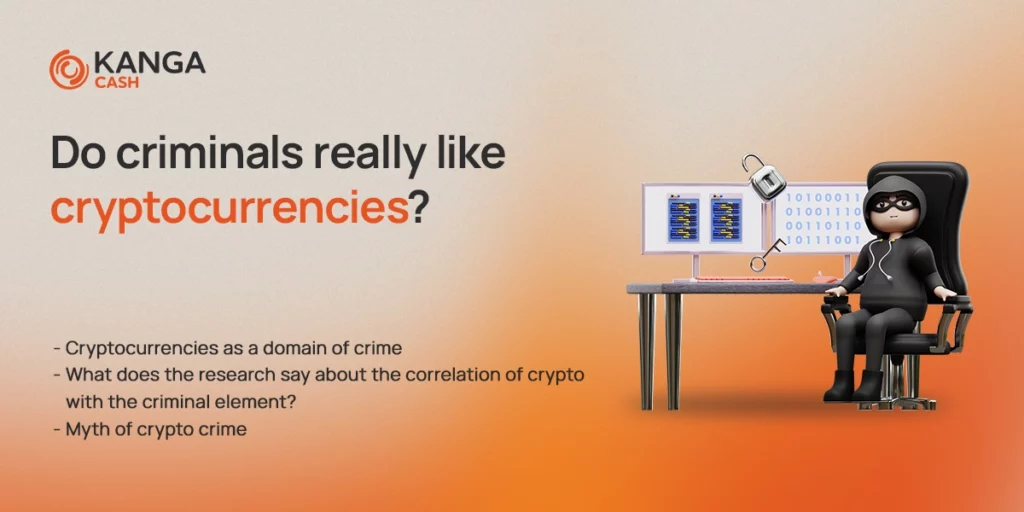Do criminals really like cryptocurrencies?

If we refer to the pop culture perception of cryptocurrencies, for example through cinema, we will notice that they are presented as one of the elements of the activities of criminal groups.
Example? The film Crypto (we deliberately do not use the Polish title “Krypto: Fear is the hardest currency”, because it sounds funny at best, banal at worst) from 2019 directed by John Stalberg Jr., with the late lamented Kurt Russel in the lead role. Citing the description of the film from Filmweb:
“Martin “Marty” Duran works as an anti-money laundering analyst at Omnicorp Bank’s headquarters in Manhattan. One day, he discovers that a potential client – a powerful corporation – has violated the law. Martin breaks off the partnership. He is demoted and sent to a bank branch in his hometown. There he uncovers a cryptocurrency conspiracy on a global scale.”
Sounds scary, right? However, what is more dangerous in our opinion, this type of narrative penetrates into the actual reality, causing people to repeatedly pair digital currencies with lawlessness. So today we will answer the question, do criminals really like cryptocurrencies (mutually)?
Cryptocurrencies as domain of crime
The mythical belief that cryptocurrencies are more closely linked to crime is strongly cultivated among academia. scientific community. Suffice it to mention David Rosenthal, a former Nvidia employee and digitization scientist at Stanford University, who in 2022 gave a presentation on cryptocurrencies in which he called them “a waste of energy” and a “crime basin”.
According to Rosenthal, cryptocurrencies have been used in large crime waves involving fraud, theft, tax evasion, and financing ill-reputed states. However, these observations do not take into account the fact that, compared to other forms of money or currencies, the scale of crime related to cryptocurrencies is actually small.
For example, in 2022, cryptocurrency ransom payments, which involve companies giving money to victims of cyberattacks in exchange for the return of stolen data or access, were worth only $16 million according to analyzes by blockchain research firm Crystal Blockchain. By contrast, the global sum of ransom payments over the same period amounted to over $400 million. The share of cryptocurrencies in this context was less than 1%.
In fact, since blockchain analytics companies such as Chainalysis began recording data, the percentage of known cryptocurrency transactions related to illegal activities such as money laundering and terrorist financing has been steadily decreasing.
A report by Chainalysis showed that at the end of 2021, only 0.15% of cryptocurrency transactions, which translates into a value of $18 billion (data recently updated from the initial $14 billion), were related to criminal activity.
While it is true that Rosenthalow has aptly identified speculation as the dominant use of cryptocurrencies, there is really no direct link between cryptocurrencies and crime.
Especially since the decline in cryptocurrency-related crime has slowed down in recent months, at least according to the latest Chainalysis report titled “Crypto Crime Report 2023”.
Most of the data in the report relates to the significant value held by three major cryptocurrency companies: FTX, Celsius, and Three Arrows Capital. These were some of the biggest players in the cryptocurrency industry that experienced a spectacular collapse in 2022 as a result of allegations of fraud. They are currently under investigation.
At the same time, cryptocurrencies themselves were not an instrument of fraud in the case of these three companies. These were the result of suboptimal business practices, inadequate investment and asset management, and wrong decisions made by leaders.
What does the research say about the correlation of crypto with the criminal element?
The introduction of an extensive cryptocurrency sanctions program by the Treasury Department’s Office of Foreign Assets Control (OFAC) in 2022 undoubtedly contributed to the reduction in the number of crimes related to cryptocurrencies. This led to the capture of several large targets, including representatives of the Russian cryptocurrency exchange Garantex. Garantex alone accounted for as much as 43% of the volume of illegal transactions in 2022.
As a result, Garantex is considered one of the main money launderers for Russian hacking groups under the sanctions, and also allegedly helped finance terrorist activities.
More interestingly, the sum of $100 million attributed to Garantex money laundering seems relatively small compared to the hundreds of billions of dollars that have already been proven laundered by traditional banking institutions (sic!).
The incidence of anti-money laundering (AML) fines globally has increased by 50% in 2022.
We will preventively point out that we are not in favor of justifying digital currencies where their fault is evident. After all, crypto as an industry is firmly rooted in the norms of traditional finance, while benefiting from the flexibility of as-yet-unsettled regulations. The cryptocurrency industry certainly needs to do a lot to improve its security, reliability and regulatory compliance for investors.
The data mentioned above gives hope that the relevant authorities finally have the tools to more precisely assess illegal activity in digital currencies.
Myth of crypto crime
Since the dawn of time, representatives of crime have been the first to use new technologies for their own purposes. Criminals willingly used the telegraph, telephone or the Internet long before the police.
However, this does not mean that this trend is to be an excuse to slow down the development of the cryptocurrency industry. Money is by nature neither bad nor good. They are only a tool to achieve specific goals. It all depends on the intention.
Just answer the question: Is every digital currency user a criminal?
Thank you for reading! For people who have arrived here, we have prepared the code “MACHLOJKA” reducing the transaction in exchange offices by 0.25% (valid until July 24!).


